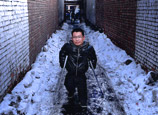
MANY sheltered urban young people don't know how to cook a meal, sew on a button or iron a shirt. They are known as the never-touch-a-pan generation. Lu Feiran reports on changing lifestyle.
Nearly eight years after getting married and having a three-year-old boy, 34-year-old Jenny Zhang, together with her husband and the toddler, is still living with her parents.
Although before they got married, the couple believed they could look after their parents better if they lived together, the fact is that the parents do almost all the chores.
"I don't know how to cook," says Zhang, a saleswoman at a chemical reagent company. "And since we both go home rather late every day, it's not realistic for us to cook our dinner after work."
Zhang's life is quite representative of the situation many young people in Shanghai nowadays. While parents are proud of their children's achievements in education and career, some of them worry that their children are totally lacking in basic domestic skills, such as cooking, cleaning, ironing, doing washing, housework, and generally taking care of themselves.
It's the instant-noodle, take-out generation. Mothers and ayis (domestic helpers) do everything and it's especially unmanly for a young man to do women's work or iron a shirt. Men and women too can go through life without sewing on a button.
A recently coined buzzword describes these inept and helpless young people - bu zhan guo. It literally means "non-stick pan" and is pronounced the same as "never touch a pan."
"My husband and I don't give much thought to this but it would be wrong to say we are not worried at all," says 60-year-old Lu Yun, Zhang's mother. "Who will take care of them when we are too old to do the housework?"
She admits, however, that she and her husband didn't bother to teach their daughter how to cook before she got married. "On one hand, we only hoped she could focus on study and later on work," says Lu. "We thought cooking was something she would naturally know how to do, but now it seems we were quite wrong."
Since many young people tend to live near their parents after they marry and spend a lot of time with their in-laws, they never need to learn to do chores by themselves.
Young couples who want more freedom and don't live with or near their parents find other ways to take care of tedious domestic details.
If they can, they hire an ayi for cooking and laundry. Or, if they live nearby, they can dine frequently with their parents and then go back to their own home.
Of course, these are young people with some means and many blue-collar young people learn to take care of themselves.
Sheen Li, a 37-year-old mother of two girls, says their ayi has worked for them for more than 10 years.
She cooks, cleans and does laundry, ironing, shopping and everything else.
"My husband is unable to do virtually anything, while I spend most of my time taking care of our daughters," Li says. "Our ayi is very kind and helpful. We love her cooking and trust her like family."
Meanwhile, 28-year-old Zhang Wen, an assistant legal adviser, and her husband live just across the street from their parents home.
"My husband and I go to my parents' place to have dinner every day," she says, "and sometimes we bring some food back home so we can reheat it for dinner the next day."
Zhang says she can cook several simple dishes, while her husband is a typical bu zhan guo. "He only knows how to make instant noodles," she says.
Many young people choose to buy their own apartment near their parents' after they marry. This gives them privacy, and it's also convenient to take care of their parents as they get older.
People call this kind of separation "the distance of a bowl of soup," indicating that the small distance means children can send their parents a bowl of hot soup, which arrives when it's still hot.

















 Missing baby killed in Changchun | Photos: Local residents mourn for killed baby
Missing baby killed in Changchun | Photos: Local residents mourn for killed baby


![]()
